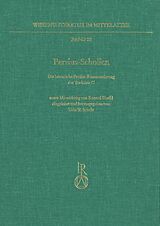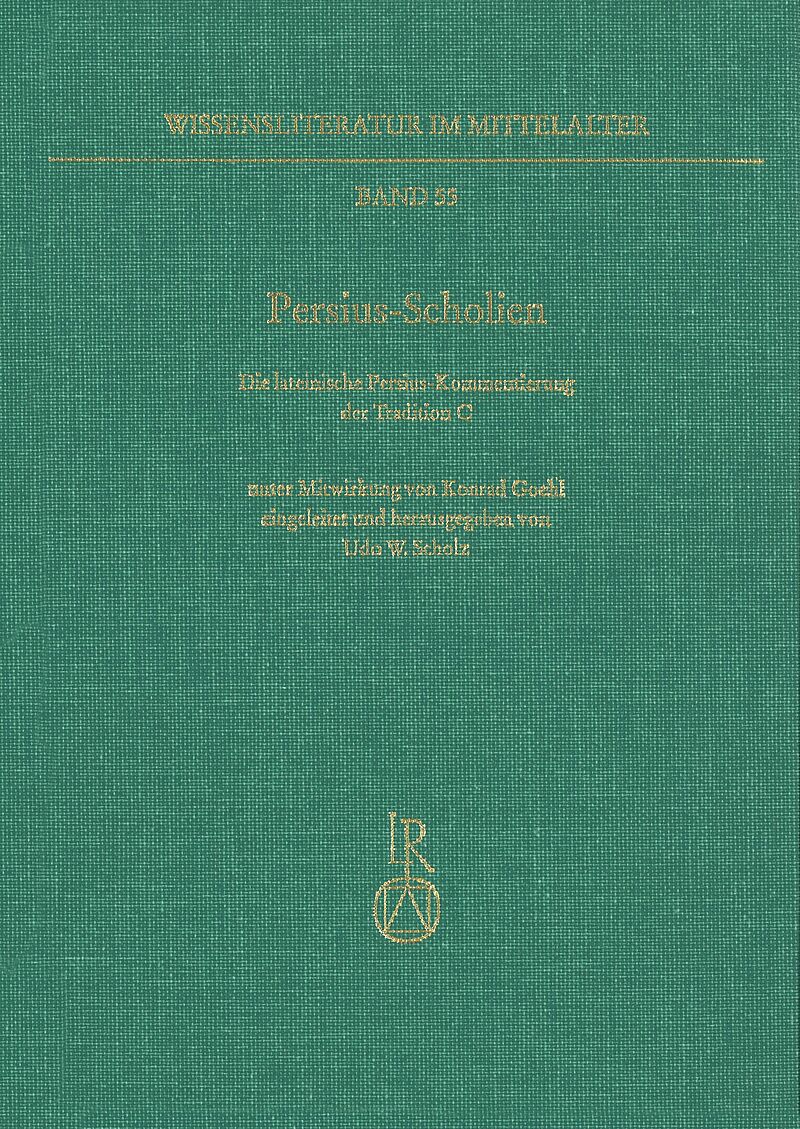Persius-Scholien
Einband:
Fachbuch
EAN:
9783954902811
Genre:
Praktische Theologie
Herausgeber:
Reichert
Die bezeugten antiken Kommentare zum Satiriker Persius (Zeit des Kaisers Nero) sind verloren, die auf ihnen aufbauenden etwa 70 mittelalterlichen anonymen Schul-Kommentare (auf denen wiederum etwa 35 mittelalterliche Gelehrten-Kommentare aufbauen) ab dem 9. Jahrhundert in 5 Traditionen (A, B, C, D und E) erhalten ihre Texte aber waren nicht erschlossen. 2009 wurden (von U. Scholz und C. Wiener im Dr. Ludwig Reichert Verlag) die Texte von 3 Traditionen (A, D und E) zusammen mit einer das Gesamtproblem erschließenden Einleitung bekannt gemacht, hier folgt in einem 2. Band mit einer weiter führenden Einleitung der Text der Tradition C. Erst wenn alle Texte vorliegen (es fehlt noch Tradition B), wird man nicht nur die Einflüsse der antiken Kommentierungen, sondern auch die Leistung der sog. Gelehrten-Kommentare abschätzen können, und damit erstmals an einem solchen Beispiel die Schul- und Bildungsarbeit des Mittelalters detailliert erforschen können.
Die Satiren des zur Zeit des Kaisers Nero dichtenden A. Persius Flaccus (34 - 62 n.Chr.) waren in heidnischer und christlicher Antike, auch im Mittelalter ein viel gelesener Text (vom 9. bis 16. Jahrhundert sind etwa 650 Text-Handschriften nachgewiesen), waren auch Schullektüre und wurden daher vielfach kommentiert.
Die antiken Kommentare sind verloren, sind aber in einem noch unbekannten Umfang in die vom 9. bis 16. Jahrhundert erhaltenen mittelalterlichen Kommentierungen (ca. 75 anonyme Schulkommentare, darauf aufbauend etwa 35 Gelehrten-Kommentare) eingeflossen. Auch diese Schulkommentare waren bisher weitestgehend unbekannt; denn die Scholien-Ausgabe von O. Jahn (1843), angepriesen als scholia antiqua, bietet nur unkritisch vermischte Texte von einigen wenigen Handschriften und das Commentum Cornuti von W.Clausen - J.Zetzel (2004) hat nur den Text von 4 Handschriften eines Zweiges jener 5 Traditionen (A, B, C, D und E), die Robathan - Cranz (1976) durch Lesungen jeweils nur des Anfanges der Kommentare als vorläufige Orientierung rekonstruiert hatten.
Eine wissenschaftliche Gesamtausgabe der Persius-Scholien ist Ziel eines Projektes, das 2009 bereits die Texte der Traditionen A, D und E im Ludwig-Reichert-Verlag vorgelegt hat, jetzt die Kommentierungen der Tradition C veröffentlicht. Eine Edition der Tradition B ist in Vorbereitung. Die Einleitungen zu den einzelnen Bänden behandeln alle einschlägigen Fragen zur Persius-Kommentierung in Antike und Mittelalter.
Die Persius-Scholien, die in seltener Vielfalt und Dichte die schulische Rezeption eines antiken Autors im Mittelalter dokumentieren, ermöglichen viele Aufgaben: zunächst die Erforschung der Persius-Rezeption in den europäischen Schulen des Mittelalters in verschiedenen Zeitstufen und unterschiedlichen Bildungsräumen. Dabei wird die Arbeits- und Verstehensweise, auch das Antike-Wissen der damaligen Schulen deutlich - und da es für noch keinen anderen antiken Autor solch eine Dokumentation gibt, hat das Projekt Modellcharakter. Sodann kann die Arbeitsweise und das Profil der mittelalterlichen Gelehrten aufgezeigt werden, die ihre Kommentierungen auf den Scholien aufbauend verfaßt haben - und dabei fällt auch ein bezeichnendes Licht auf die Leserschaft dieser Gelehrten-Kommentare. Schließlich kann, wenn die mittelalterliche Kommentierung in ihrer Eigenart erkannt ist, nicht nur der Versuch unternommen werden, detaillierter den Anteil antiker Persius-Kommentierungen am Material der mittelalterlichen Scholien herauszuarbeiten, auch die bildungs- und geistesgeschichtlichen Entwicklungen vom antiken zum mittelalterlichen Kommentar und deren Besonderheiten sollten Ziel weiterer Untersuchungen sein.
Autorentext
Udo W. Scholz
1939 born in Breslau; 1957 - 1962 studies in Classical and German Philology and History at the Universities of Munich and Erlangen; 1962 PhD; 1963 state exams; 1969 Habilitation in Classical Philology at the University of Erlangen; 1969 - 1974 Assistant Professor at the Univ. of Erlangen; 1974 - 2007 Full Professor at the University of Wuerzburg (Dr. h.c. of the Universities of Caen / France and Thessaloniki / Greece). Focus of research: Latin literature, especially of the classical times in antiquity; Roman religion, especially of the state cults; edition of the scholia of Persius.

Leider konnten wir für diesen Artikel keine Preise ermitteln ...
billigbuch.ch sucht jetzt für Sie die besten Angebote ...
Die aktuellen Verkaufspreise von 6 Onlineshops werden in Realtime abgefragt.
Sie können das gewünschte Produkt anschliessend direkt beim Anbieter Ihrer Wahl bestellen.
Loading...
Die aktuellen Verkaufspreise von 6 Onlineshops werden in Realtime abgefragt.
Sie können das gewünschte Produkt anschliessend direkt beim Anbieter Ihrer Wahl bestellen.
| # | Onlineshop | Preis CHF | Versand CHF | Total CHF | ||
|---|---|---|---|---|---|---|
| 1 | Seller | 0.00 | 0.00 | 0.00 |
